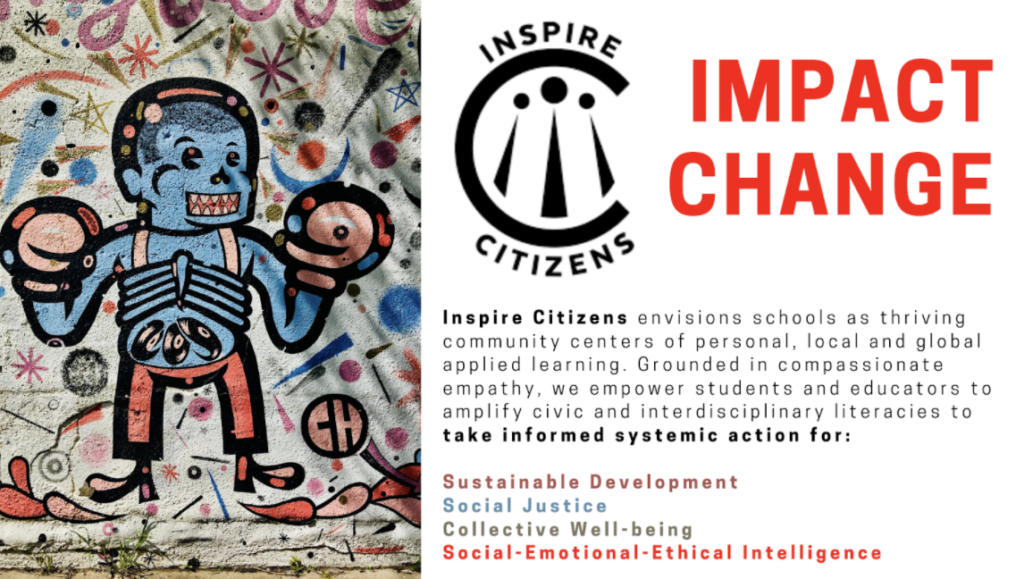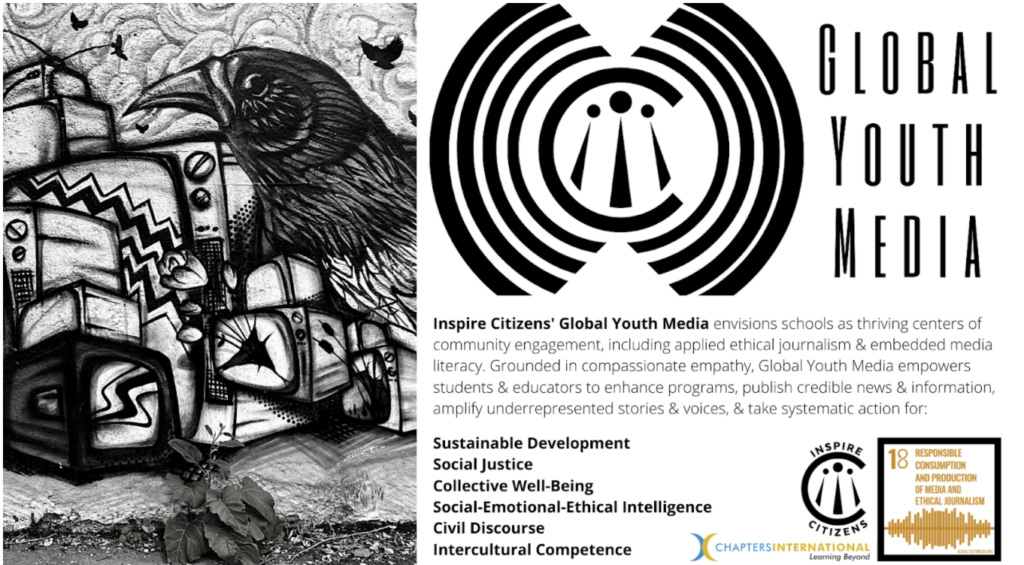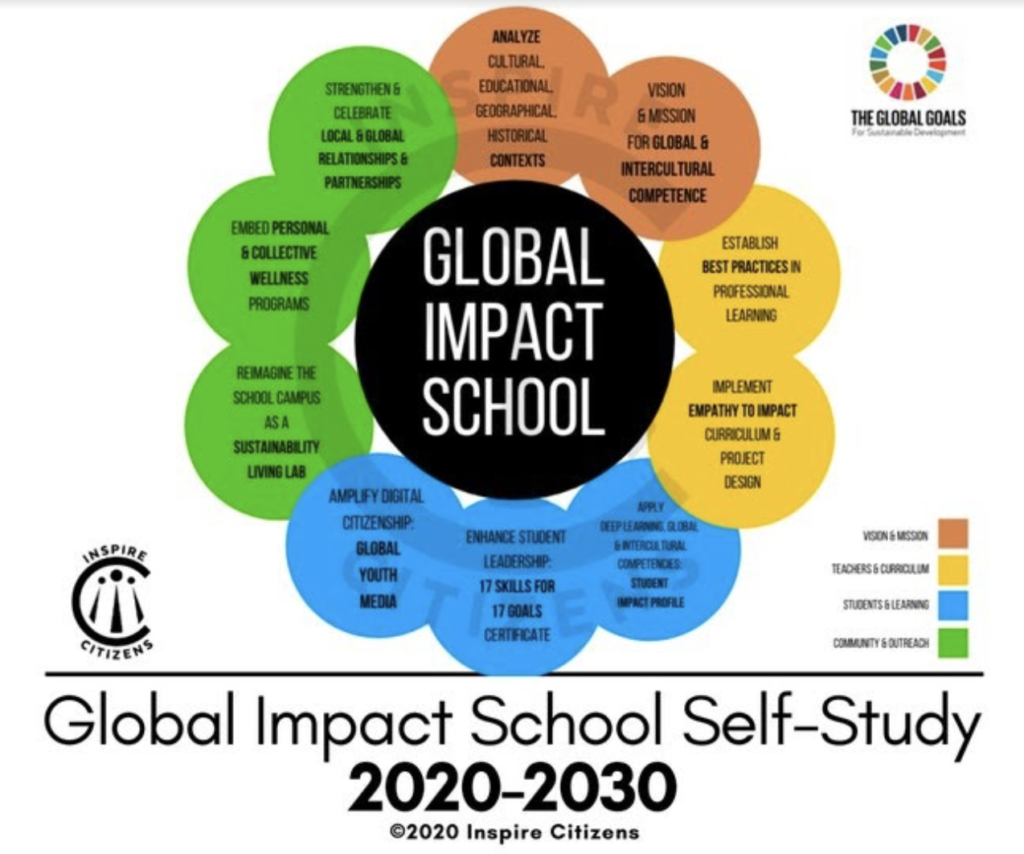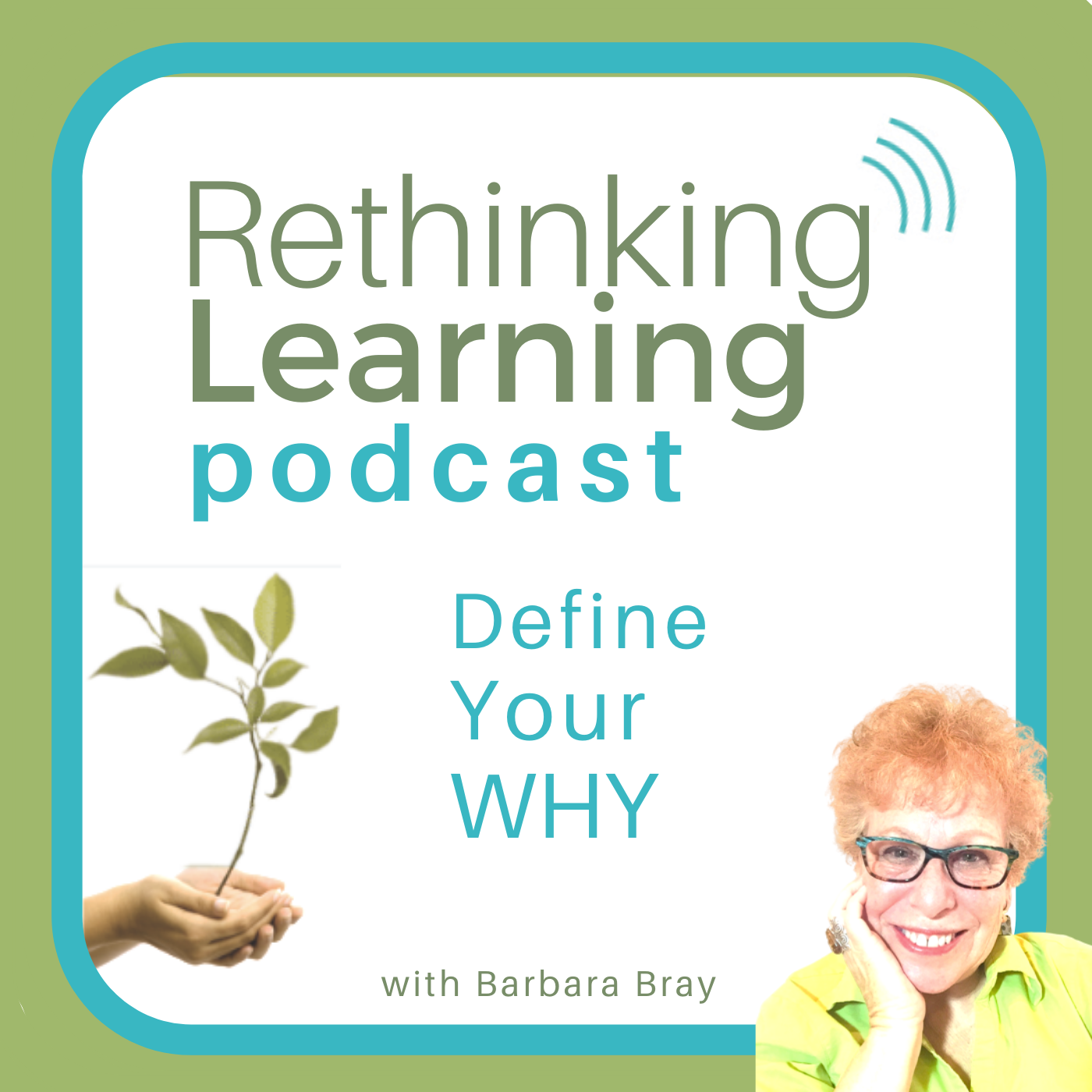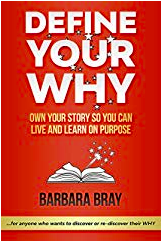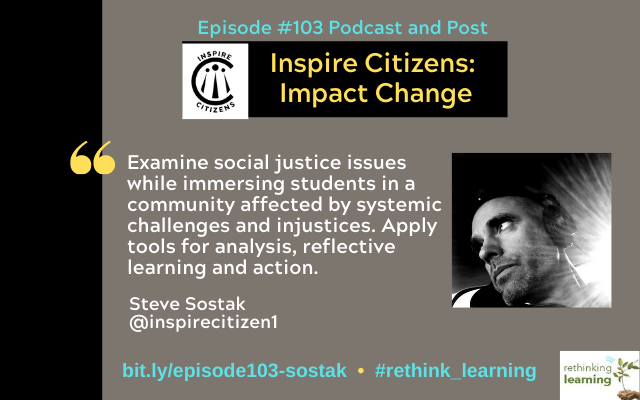
Podcast: Play in new window | Download
Subscribe: Spotify | TuneIn | RSS
Steve Sostak, @inspirecitizen1, is co-director of Inspire Citizens, author of the Global Impact School Self-Study, designer, and director of the IC Master Teacher Endorsement, co-director of GlobalYouthMedia.org, and a global education facilitator, implementing @SDG2030 into school-wide learning experiences.
Following 15 years teaching elementary and middle school in the U.S., Peru, Malaysia, and China, Steve specializes in working with schools, teachers, and students to illuminate how schools can thrive as community centers of personal, local, and global applied learning. Grounded in compassionate empathy, Steve and Inspire Citizens empowers students and educators to amplify civic and interdisciplinary literacies to take informed systemic action for Sustainable Development, Social Justice, Collective Well-being, and Social-Emotional-Ethical Intelligence.
Steve and I had this conversation in April before the end of school during the pandemic and most schools were teaching remotely. We talked about navigating the truth, well-being, compassion, social justice and equity issues, educating for sustainable development, taking care of ourselves during this crisis, and more. Steve shared many ideas and resources that pushed my thinking. I know you will be inspired! Enjoy! Listen, check out the resources here, and reach out to Steve and Inspire Citizens.
Your story about your background
Quick overview: Chicago son of a teacher and electrician, broken family, closest friends African American and Iraqi American, floor sander, waiter, musician → teacher
Back in 2007, when I was teaching grade four in Lima, Peru, my wife Angie, who was four months pregnant at the time, and I stood at 3259 meters in Huancayo, breathing in the crisp alpine air, finalizing the adoption of our two Peruvian daughters, Jessica Rocio and Maria Fatima, who at the time were 15 and 5-years-old respectively. Inside the Aldea Infantil El Rosario, we had been tasked with providing 75 pollos de la brasa, rotisserie chickens with sides of thick-cut french fries, Peru-style, for the orphanage children and the caretakers, in celebration of the adoption and a new beginning on an incredible journey that started years before when Angie and I decided to leave Chicago for Lima, trading challenges of inner-city Chicago schools for new challenges in international teaching.
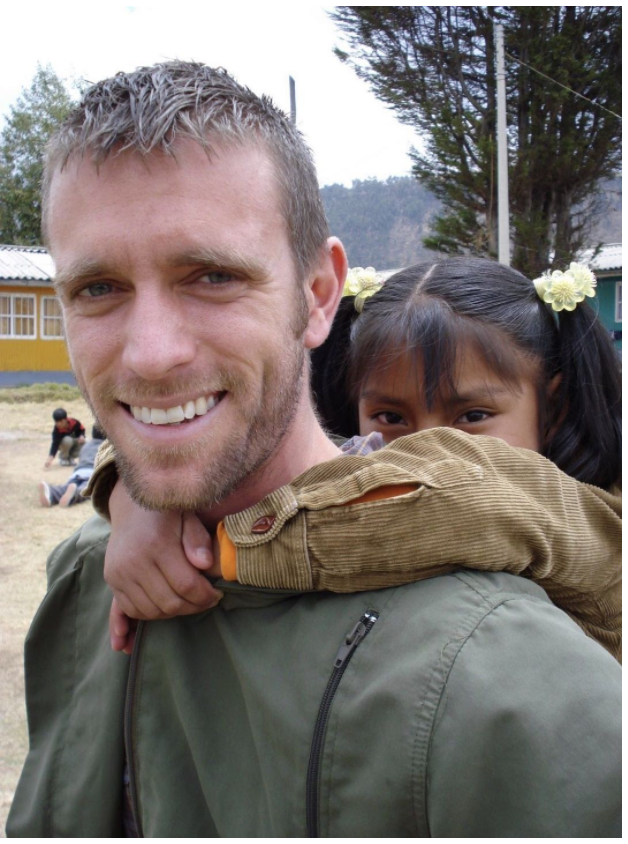
Fatima and Steve Sostak on adoption day at Aldea Infantil El Rosario
Your story about your family
While in Lima, we had led a service-learning group from our school in supporting weekly visits to an abandoned and abused girls shelter where we connected with all of the children but especially Jackie and Melissa who were not available to be adopted despite their difficult situations. Melissa has become like a fourth daughter, and we have been able to provide her with an education, helping her graduate from university in Lima. She’s a fantastic 26-year-old person now and is trilingual, having been inspired to learn Chinese after we moved to Beijing. Jackie is now 23 years old and has her first child. She is working a low-wage job to make ends meet in Lima, and many days, I still struggle in thinking about what I could have done better for her future.
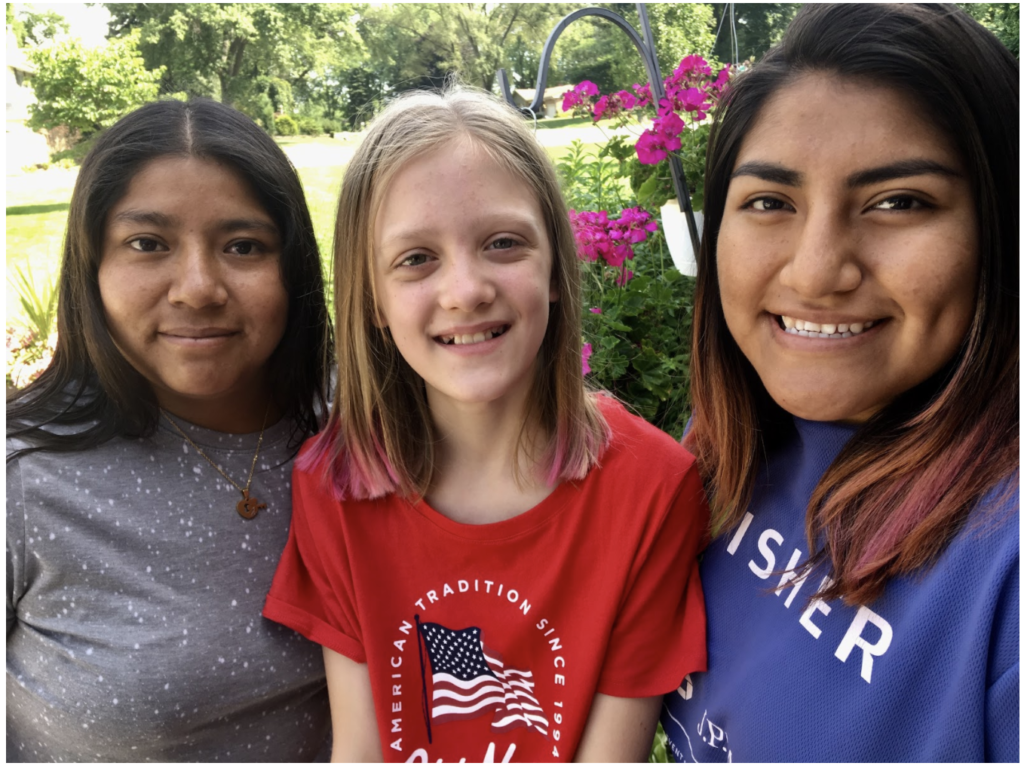
Steve Sostak’s daughters in 2018: Jessica, Lucy, and Fatima
Though Angie and I had been involved with diverse schools and friendships in Chicago, our passion for deep service was truly sparked then, in 2005 working with children like Jackie. When my daughter Lucia Belle was born three months following the final signatures on the adoption papers for Jessica and Fatima in early 2008, my family went from two idealistic, tattooed teachers from Chicago to an instant family of five: A teenager, a kindergartner, and a newborn. Two languages. Three age ranges. And two Jack Russell Terriers for some added chaos.
I wanted to start with some context to my life before sharing one of the Inspire Citizens frameworks and talk more about the work I am doing now. Leaving Chicago for Peru, and then Malaysia, and then China, led me to become more globally competent, transforming my life.
Your journey as a teacher and the next journey
There are many turning points in personal histories – causes, effects, changes, continuities, perspectives, successes, failures, elation, suffering. We all are in constant evolution. Still, the Peru time centered me, it was the birth of my vocation, a calling to link my personal strengths and talents to the needs of others outside of myself. I knew then, as a teacher, my students and I could positively and deeply impact communities beyond the walls of our classroom. Helping students to find their own vocations, projects, and callings amplified learning in powerful ways. Rooted in greater global competency, community engagement, deep thinking, relevant solutions, and impact on personal happiness and the wellbeing of others and the planet, Empathy to Impact became an idea that grew and grew in my mind.
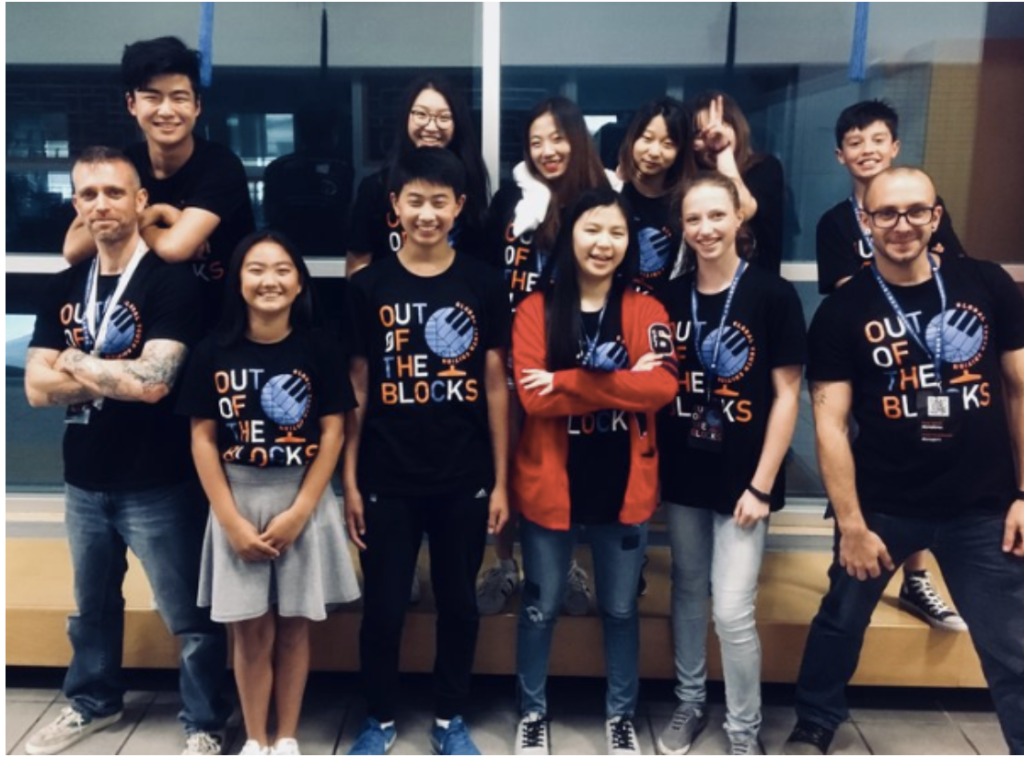
Out of the Blocks Podcast: Global Youth Edition,
Futures Public Radio, Beijing, China
Empathy to Impact Approach
I quickly realized, this teaching style didn’t have to fight against the expectations of existing academic standards. In fact, my students were more engaged, finding relevance in applying their skills to things they cared about. They often grew more than projected because of this. I began utilizing the Empathy to Impact approach more and more. Parents and administrators saw kids that were dedicated to their greater community, were leaders and kinder to one another and were thriving academically. But frustratingly, the teaching approach tended to stay pocketed in my classroom or in the classrooms of a few other colleagues. #EmpathytoImpact
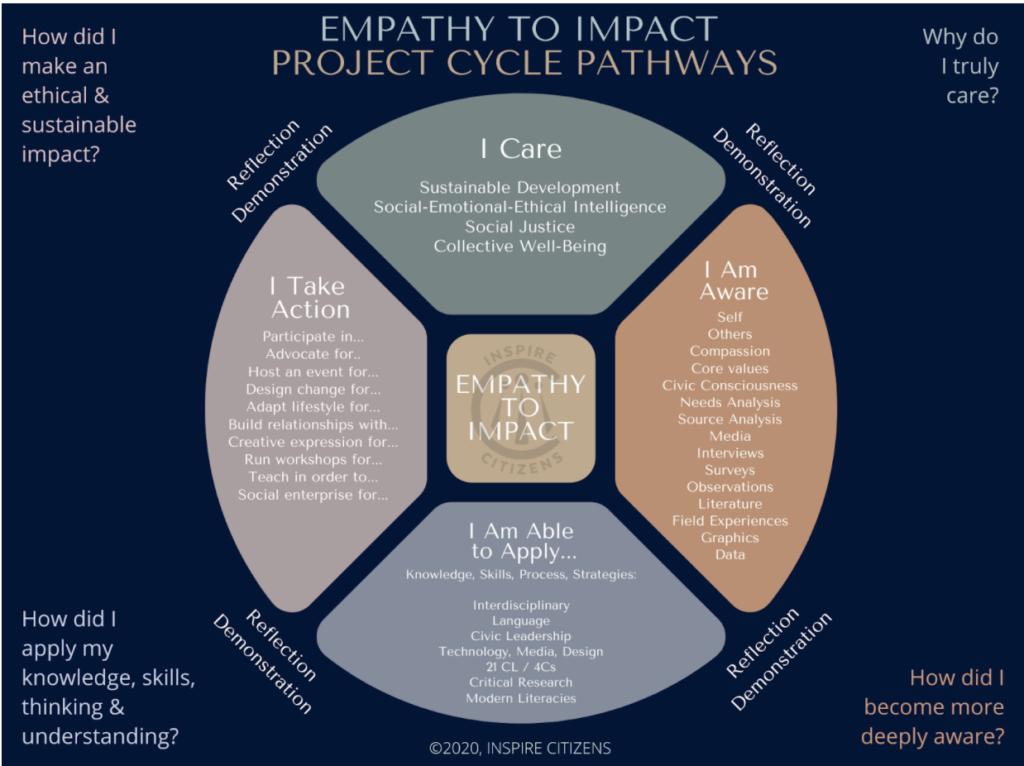
In 2019, and especially in 2020 as we must collaboratively work towards overcoming coronavirus and other zoonotic diseases, systemic racism, a myriad of inequalities, more schools have responded to meet the needs of students, teachers, and communities by seeing the need for relevant service learning and action opportunities. By using such tools as the United Nations Sustainable Development Goals (SDGs), all teachers can more easily help kids link what they love, what they are interested in, and what they are learning to some of the world’s greatest identified needs. For Inspire Citizens, we now call that framework Talent + Target = Vocation. As an example, here’s mine where I link my personal talents and skills to three of the 169 SDG targets:
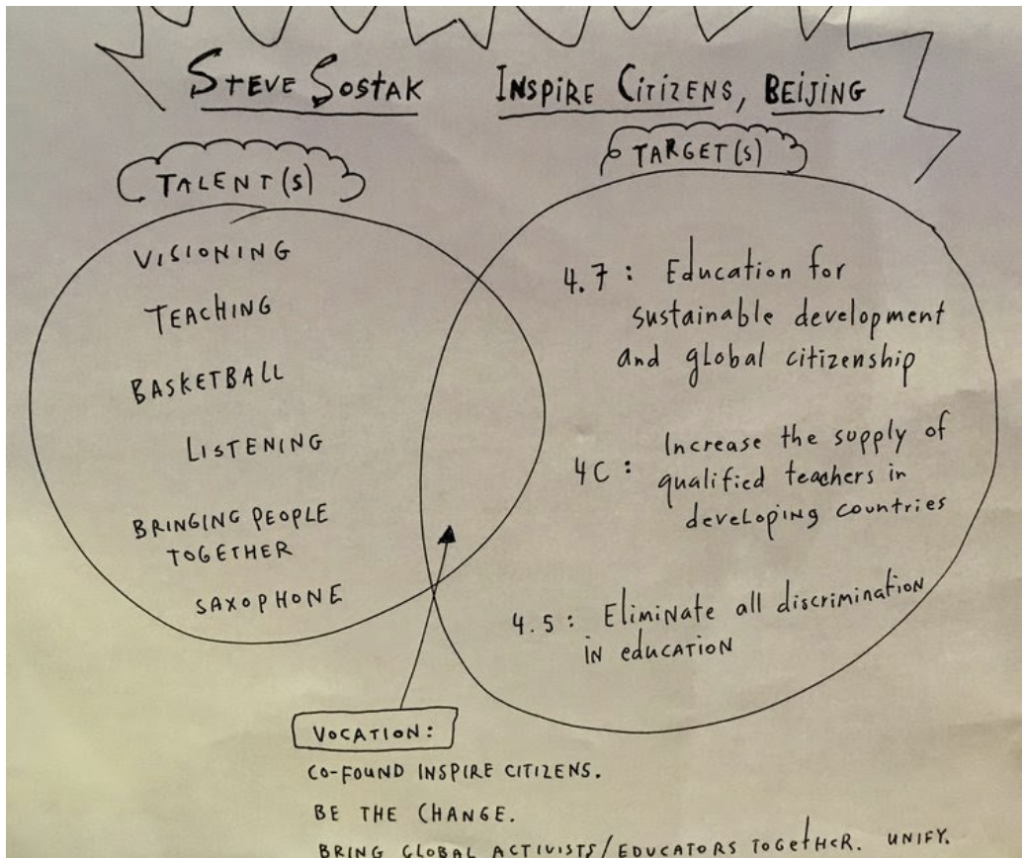
My Talent + Target = Vocation for starting Inspire Citizens
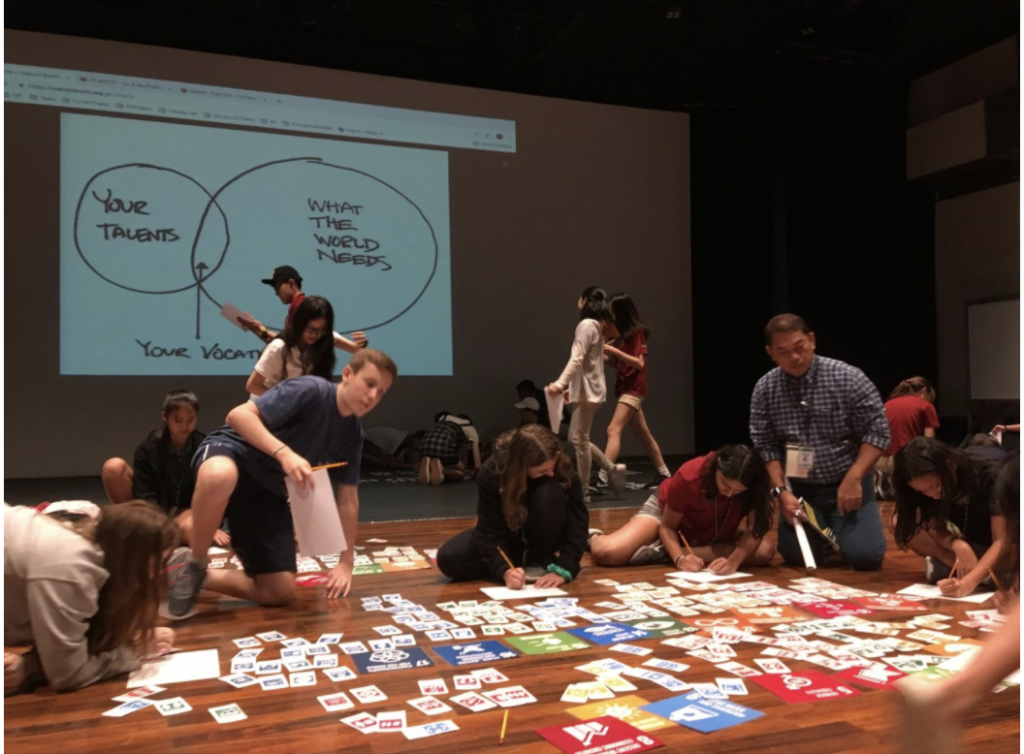
Students at the Global Issues Network Conference in Manila, Philippines work on their own personal projects or vocations using Talent + Target = Vocation
Inspire Citizens’ Story
Just over two years ago, I stepped away from day-to-day teaching to travel globally and share this vision along with an incredible co-teacher and co-director, Aaron Moniz. Working collaboratively in classrooms was wonderful for Aaron and me, but we knew we could have a greater impact if we took the leap to create something with a wider reach, connecting with educators and students around the world with hopes of making our collective future more sustainable and just. It’s working. Partnerships are growing on all continents, and last year, we added the fantastic Kavita Tanna to our Inspire Citizens team as deputy director with a focus on embedding holistic well-being into global competence. Last month, Donna Guerin joined to co-direct our Global Youth Media international hub, ethical journalism and media labs, and teacher training for critical media literacy.
At the core, Inspire Citizens supports schools to take the strengths of what is already happening and reframes community mindsets and student-centered learning experiences for greater empathy and impact, all linked to the application of essential interdisciplinary, language, and technology standards. For partner schools, we apply best-practices in professional learning to contextualize and delve deep for a number of years in attaining a Global Impact School status, supporting everything from pedagogical growth, to student leadership, to civic Global Youth Media programs, to unit planning, to training the trainers and working with the parents and local community.
Teachers and students are coached to work in a service-learning, PBL, or inquiry cycle that is enhanced by a dedication to deeper thinking and action. And student outcomes center on global competencies, rooted in civics, citizenship, service, and justice, but also in the context of each community. Our Student Impact Profile is being adapted by numerous schools internationally as a graduate profile, highlighting pathways for students to make a greater impact for social justice, collective wellbeing, and sustainable development while amplifying skills and learning more about the potential of humanity. On August 30, 2020, we will be launching our first exciting and challenging Master Teacher Endorsement institute that is built from unpacking of the elements, thinking, and facilitation skills educators can use to bring this level of global competence to life.
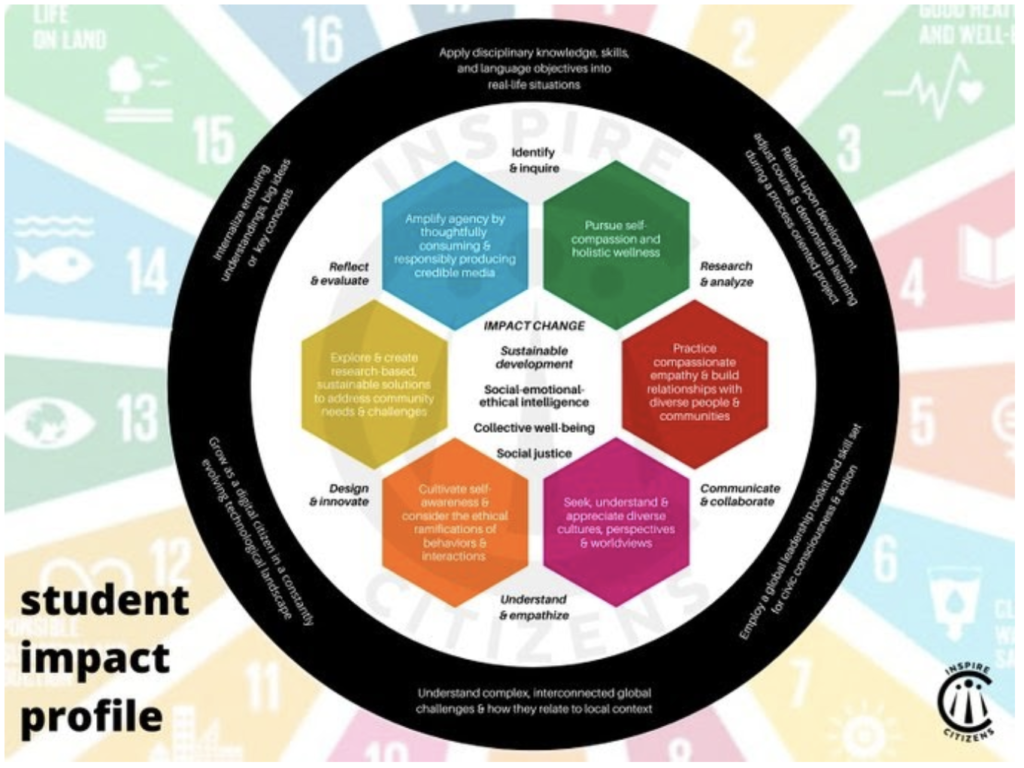
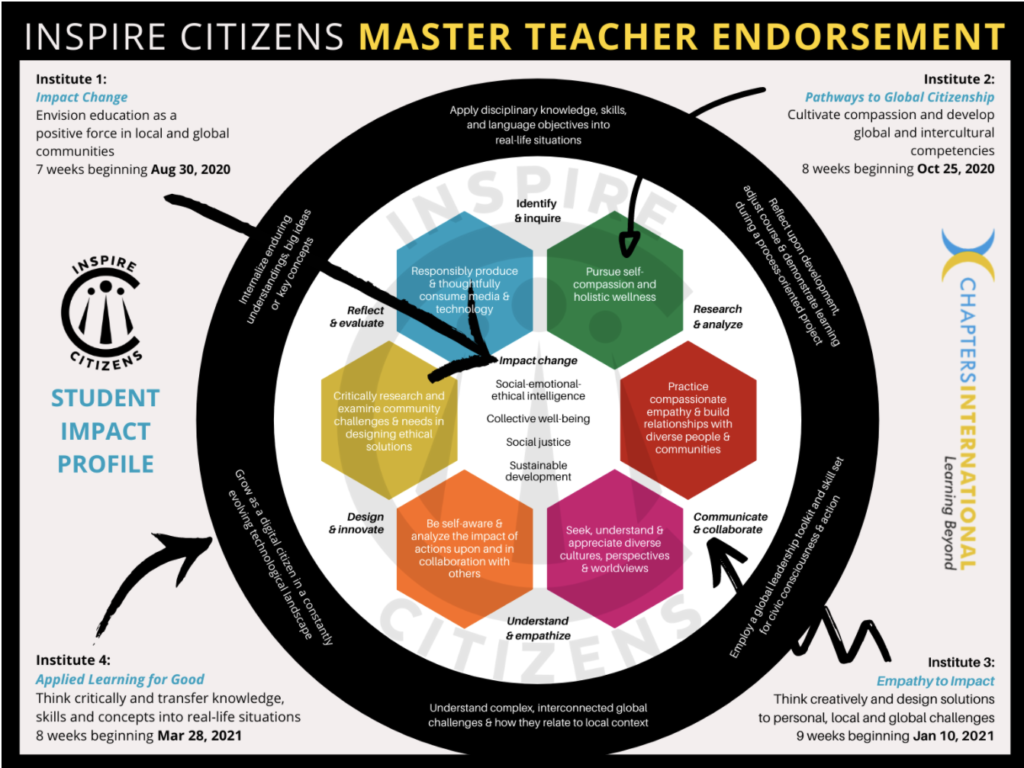
In the end, as educators, we have to ask ourselves, what is the purpose of school? What’s our vocation? My goal has always been to help my own children and my international students find learning relevant, be well, positively impact the world, and experience life through their own journey, transforming futures in a way that I did beginning in 2005. Today, more than ever, we need to urgently address the devaluation of civic education and support students in becoming resilient local and global citizens and leaders. Maybe hearing directly from one of the kids (Inspire Citizens Global Student Leader Lucy) is the best way for us to spark this collective educational vocation for the good of all and the planet:
What is your WHY?
Transforming policy or an educational system for greater equity and sustainability is going to be serious work. I do think schools can be the “innovative” hubs of this type of work and thinking and help guide society towards a better future but the forces that exist in partisanship, media, corporate greed, racism and sexism, and profit-based educational forces – it’s a lot to digest and face. It’s uncomfortable and challenging but if each of us, including students, can urgently and positively chip away at these forces, there’s a brighter future.
******
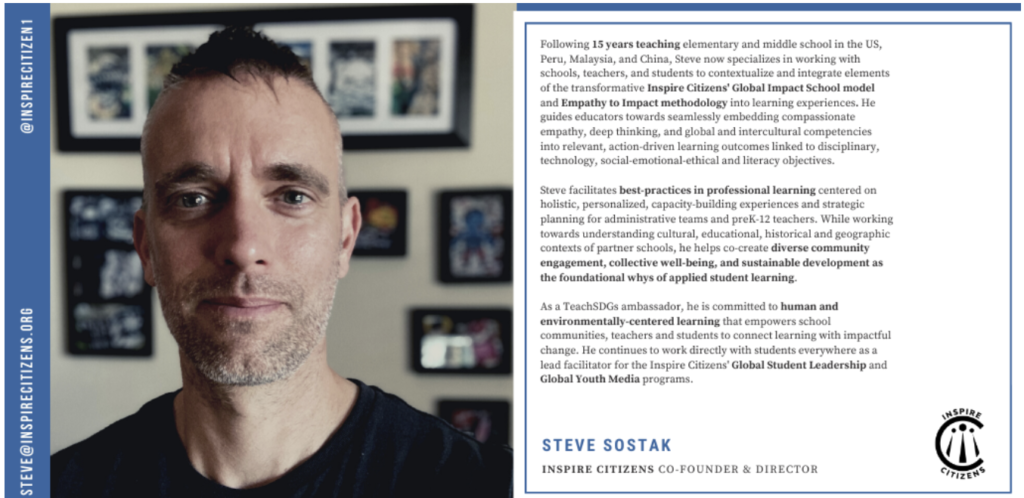
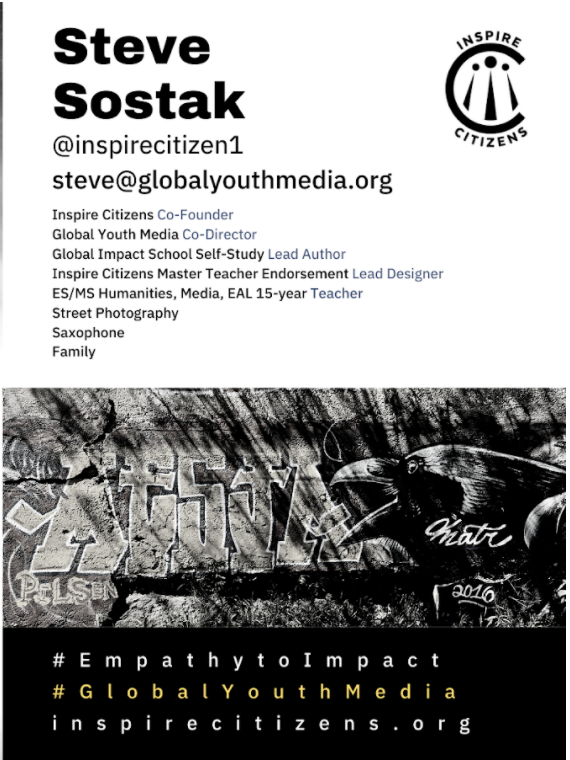
*****
Interested in checking out more of the Rethinking Learning podcasts and reflections, click on the podcast tab at the top, the logo below, or go to https://barbarabray.net/podcasts/
Go to this page for resources, questions, and more information about Barbara’s new book, Define Your WHY. Make sure you check out Steve Sostak’s story on pages 171-174.



